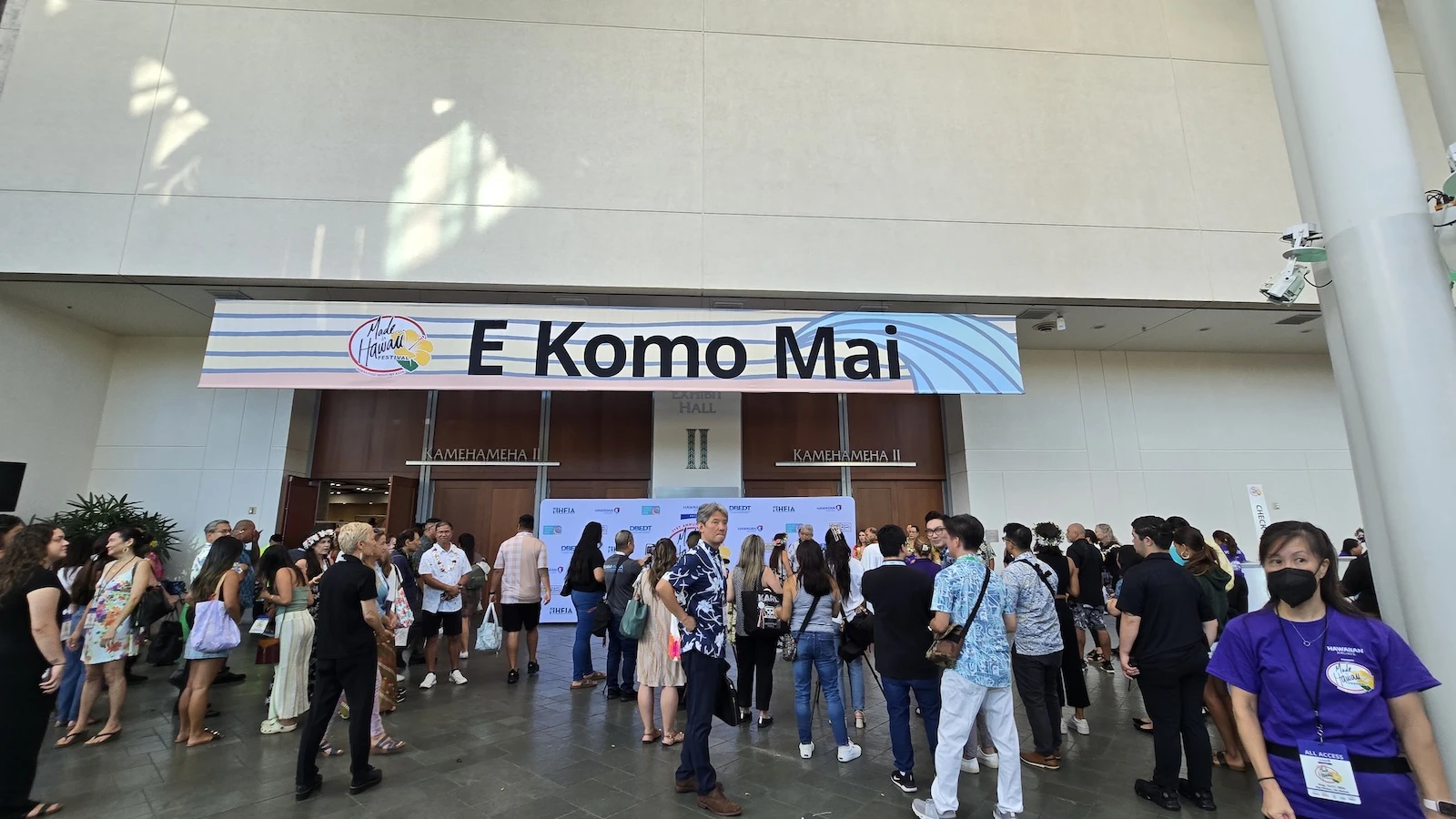For Brad Baer, managing director at ‘Alohilani Resort Waikīkī Beach with Highgate Hawai‘i, his expectations when participating in Movers and Shakas' Hawai‘i Talent Onboarding Program, or HITOP, were simple.
He wanted to learn more about Hawai‘i's culture and how to best communicate and connect with his new team members.
"I feel that they accomplished that," he recently told Aloha State Daily.
Movers and Shakas is a nonprofit that runs place-based, community orientation programs. HITOP is its six-week acculturation program that introduces business leaders and executives who have recently relocated or returned to the Islands to Hawai‘i's culture, history and community.
It aims to help new transplants and returning kama‘āina live and work successfully here, and to help local employers retain and empower the leaders they've recruited.
Baer was one of 18 leaders who recently completed HITOP's Cohort 7.
Originally from Phoenix, Baer moved here from San Diego after a career that also took him to different locations in Arizona, Pennsylvania and South Carolina.
Baer has only been here about four months. He says he has always loved the Islands and the culture, and had been traveling back and forth to the state because his daughter attended Hawai‘i Pacific University. He also noted his admiration for Highgate, a company he says understands the importance of community and "being part of those communities that other associates live in."
While that made him a little more comfortable coming here, Baer knew, though, there would be some obstacles when moving.
As an executive in the tourism industry, Baer says he knows that tourism brings "a lot of wonderful economic value to communities and it has a lot of positive impact with jobs and really being able to showcase what an area has to offer."
But there are also concerning parts to the industry as well, he says. Coming to Hawai‘i, "I knew that would be a challenge."
Joining Highgate made that a bit easier to overcome, he says, and the company put him through Movers and Shakas right away.
"What a great way to start off to really learn a little bit more about what concerns people might have with tourism and also understand more about the history of Hawai‘i and the culture and how to navigate some of that ... to make connections with my staff, to make connections with the community," he says. "Those are essential for me to be successful in what I do. Movers and Shakas really helped to get me on a good path to being successful with that."
Baer says it was time well spent. So much so, "I would have kept going if given the opportunity."
Not only did he get to learn about about and understand the story of Hawai‘i better, Baer says it also was a chance to connect with others who are still new to the Islands.
"I feel I came away with a lot more knowledge on the history of Hawai‘i and what the challenges we face here in Hawai‘i [are], and also I came away with just so much stronger inspiration to want to stay engaged in the community while I'm here."
Kimarie Matthews, an executive vice president at Bank of Hawai‘i, was a member of the first HITOP cohort, which she joined about a year after moving to the Islands from San Francisco.
"I think it came at a really good time," she recently told ASD. "I actually don't think you could ever do it too soon because it is so important when people move here that they understand this is a very unique and different place from where they came. It is unlike any other, and you have to first start with understanding it before you can be effective.
"... I feel like you have to understand the context and you also have to understand how business is done here and how that's different," Matthews continued. "You just need to slow down, listen, build relationships [and] not expect that what worked before for you is going to work here. The great thing about HITOP is it's a condensed program where you can really just immerse in those concepts."
People who move here also face challenges in meeting people, building community and making Hawai‘i feel like home, she says.
"We all know that Hawai‘i is incredibly friendly and lovely to live in, but it's one thing to come here and visit. It's another thing to actually build community, and sometimes it's hard for people from the outside to do that."
HITOP helps with that, too.
Pandemic beginnings
When Movers and Shakas first launched in 2020, it was both popular and controversial.
Started by a group of local business and community leaders as a way to help the local economy and community when travel and tourism came to a standstill in the early days of the Covid-19 pandemic, Executive Director Nicole Lim says the idea, at the time, was to bring remote workers from the continent to come help with local nonprofits.
It was incredibly popular, she says.
She's not kidding. According to Lim, there were 90,000 applicants for 50 cohort spots when it launched that December.
"And it was equally unpopular here locally and kind of was a lightning rod, I think, for a lot of the frustrations around housing and the economy, actually," she recently told Aloha State Daily. "I was quite opposed to the program as well. Like why are we bringing tech bros here with Covid during the pandemic? They're going to drive my rent up and destroy the aloha spirit."
She's not kidding about that, either.
Lim felt so passionately about it that she wrote an op-ed in the Honolulu Star-Advertiser against the program.
A few of the organization's board members then reached out to Lim and asked if she'd be interested in running the program.
"I've never gotten a job that way [before], but it remains a dream job for me for many reasons of just being born and raised here, and getting the privilege and opportunity to go to school on the continent and building a career there."
Lim went to college and business school on the East Coast, worked on the West Coast, and spent the five years before Covid traveling the world as a "hippie, analog nomad" before returning to the Islands.
Movers and Shakas is a "dream job," she says, because she gets to use her experience to "build something that benefits my home state."
"That's really exciting and a lot of what we do is about helping people build relationships, authentic relationships, in a way that benefits our state and our home."
Pivots
The nonprofit offered two cohorts of the remote worker program, when the world shifted yet again.
"Remote work changed and it was less 'work from anywhere' and more of a hybrid model," Lim says. "And tourism rebounded to a large extent. I realized that in doing some of the cultural education programming, we had created a kind of Hawai‘i 101 place-based community orientation program."
She says several board members had talked about hiring executives from the Mainland who left in 12 to 18 months "because they just didn't get it. They were a bull in a china shop while they were here."
Lim had the idea to pivot — sunsetting the remote worker program and offering a new community orientation program to help employers retain new leaders.
"As we know, if you can't build relationships in Hawai‘i, you won't be very effective at your job," she says. "And if you don't have a sense of belonging, you won't feel very effective at your job either. This program became Hawai‘i Talent Onboarding Program, or HITOP."
The six-week program focuses on cultural education, community service and networking, three pillars of learn, contribute and connect that Lim says help build a sense of belonging and shared stewardship for Hawai‘i.
Since it launched three years ago, Movers and Shakas has acculturated 175 people through seven cohorts, a recent announcement noted.
The most recent cohort included executive and leaders from the likes of Bank of Hawai‘i, Booz Allen Hamilton, the City and County of Honolulu, Hawai‘i Dental Service, Hawai‘i Pacific University, Highgate Hawai‘i, Civil Beat, Kāhala Nui, Marine Corps Base Hawai‘i, Punahou School, Teach for America, TRUE Initiative, and YMCA of Honolulu.
Their program included three community work days with Ka‘ala Farm, Hale Kipa and The Pantry by Feeding Hawai‘i Together, along with leadership training workshops, networking events and talk-story sessions through partnerships with Leadership Works, ‘Iolani Palace, Native Hawaiian Hospitality Association, cultural practitioners and community leaders.
According to the announcement, surveys from past cohorts have found that 100% of participants improved their understanding of the host culture, 90% improved their sense of Hawai‘i as home, 94% improved their sense of shared stewardship; and 90% improved their work effectiveness and deepened their sense of belonging.
"We tend to see when people feel like they belong more ... they understand how their decisions impact the state and care about that impact," Lim says. "That's really the goal — to have people really understand that as business leaders, they're also expected to be community leaders and leave this place better than when they found it, which I think is something very unique to Hawai‘i that I didn't feel in the same way in San Francisco or L.A or other cities that I've lived and worked in."
Movers and Shakas has piloted other formats, too.
Lim says she's done a one-day session dubbed Learning to Live Aloha for folks who aren't based here in the Islands, but who serve Hawai‘i customers or work with Hawai‘i teams. They also piloted a one-day Learning to Live Aloha program in Las Vegas.
"That's a format that I think we'll keep experimenting with," Lim says. "I would say things that we're expanding towards is this idea of 'Hawai‘i beyond our shores.'"
The idea, she explained, is borne out of the idea of helping acculturate people coming into Hawai‘i and people who aren't based in the Islands, looking at what it means to be connected to Hawai‘i even if you're not physically here.
Lim says that's not a firm plan yet, but where Movers & Shakas is looking to expand its focus.
For more information or to register for HITOP’s Cohort 8 in Fall 2025, visit www.moversandshakas.org/enroll.
For the latest news of Hawai‘i, sign up here for our free Daily Edition newsletter!
Stephanie Salmons can be reached at stephanie@alohastatedaily.com.





